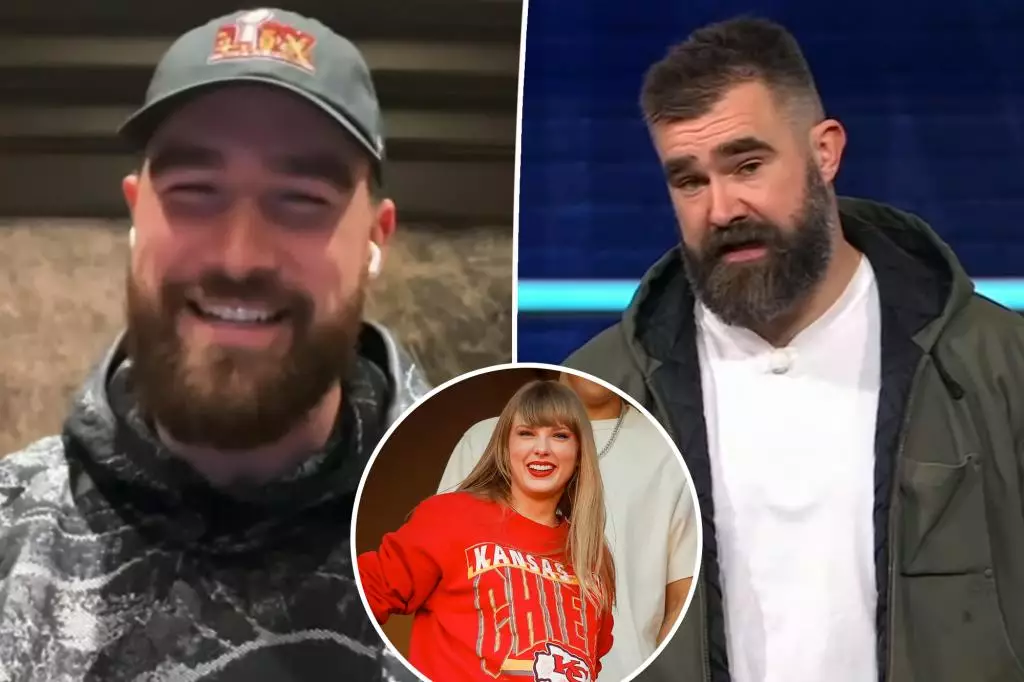In an era where the intersection of pop culture and sports often creates unexpected narratives, the NFL playoffs have found themselves at the center of a swirling conspiracy involving Taylor Swift. Brothers Travis and Jason Kelce, prominent figures in the league, recently engaged in a light-hearted banter that inadvertently highlighted a growing skepticism among fans regarding officiating and the integrity of the game. Amidst calls from fans and commentators alike about the playoffs being “rigged” in favor of the Kansas City Chiefs, the playful yet pointed exchanges between the Kelce brothers provided a humorous lens through which to examine this serious situation.
During a video appearance on “They Call It Late Night,” Travis Kelce jested about attending the Super Bowl, implying that he would have done so if the Chiefs had lost their AFC championship game. His quip about blaming Buffalo Bills quarterback Josh Allen for not stepping up was part of a playful engagement that, while lighthearted, raised questions about the precarious line between jest and serious critique in the NFL. Jason’s follow-up questioning of whether they should blame the officials highlighted the often-entrenched opinions that the referees’ decisions carry significant weight in determining outcomes of pivotal games.
The Kelce brothers’ lighthearted roasts reveal how deeply fans engage with their teams, and their comments mimic the larger discourse on social media platforms where fans vent frustration about perceived unfairness. Amid this banter was an undercurrent of serious allegations of bias that have spread throughout fanbase discussions and commentary segments.
What bonfire of speculation ignited the conversation around Taylor Swift’s presence at NFL games? As the pop icon has become a recurring face at Kansas City Chiefs games since her relationship with Travis Kelce began, her influence on viewership numbers has garnered both admiration and skepticism. Commentators such as Skip Bayless have suggested that Swift’s fans—collectively known as “Swifties”—are now a driving force in NFL ratings, claiming that the league is eager to secure her presence at key events like the Super Bowl. This rather intriguing label of the “Swiftie Effect” posits that her viewership has substantial power over audience numbers to the point that it could influence game officiating.
As Bayless asserts, this almost conspiratorial notion suggests that NFL officiating may be subtly biased toward the Chiefs, allegedly to ensure favorable outcomes that facilitate Taylor Swift’s continued involvement. This comment not only incited a humorous debate but also drew attention to a serious critique of the NFL institutions and their reluctance to address claims of officiating bias or the role of celebrity in sports entertainment.
As the Chiefs prepare for another Super Bowl appearance, the narrative around the ‘Swiftie Effect’ continues to swell. The allegations of rigged outcomes in favor of the Chiefs meld into broader concerns about the integrity of the sport and officiating practices. Even former NFL officials like Dan Brandino have acknowledged that such conspiracy theories exist and gaining traction among not just fans but within personal circles, further complicating the narrative.
While some dismiss such conspiracies as fan-driven whimsy, they illustrate an ongoing frustration with the transparency and fairness of the NFL’s decision-making processes. As fans express discontent and commentators amplify these concerns, the discussion surrounding Taylor Swift not only reflects a fascinating intersection of culture and sports but also raises questions about the NFL’s responsibility towards ensuring unbiased conduct within their games.
The playful exchanges between the Kelce brothers, coupled with serious allegations from fans and commentators, underscore a broader dilemma regarding the way celebrity culture intersects with sports. The NFL must navigate this complex landscape while maintaining its legitimacy. As the Chiefs gear up for the Super Bowl, the spotlight remains on not just the teams, but also the larger implications of fame, fan dynamics, and institutional accountability. The interplay of entertainment and athletic integrity continues to be a topic ripe for discussion, leaving a lingering question: How far can the sport stretch to embrace celebrity influence without risking its authenticity?

